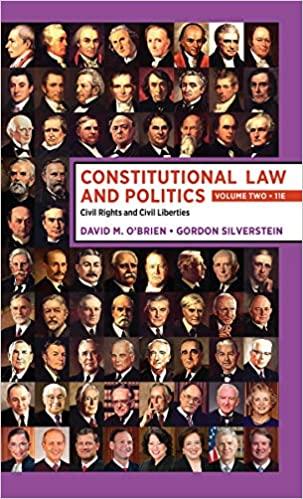Question
Read the case below and give me your own opinion if you agree or disagree with the court rulling and why. There's no limit word
Read the case below and give me your own opinion if you agree or disagree with the court rulling and why.
There's no limit word count, just not too short.
Case : Kirtsaeng V John Wiley and sons
Background - In 2008,John Wiley & Sons, Inc.filed suit against Thailand native Supap Kirtsaeng over the sale of foreign edition textbooks made outside of the United States marked for sale exclusively abroad which Kirtsaeng imported into the United States.When Kirtsaeng came to America in 1997 to study atCornell University, he discovered that Wiley textbooks were considerably more expensive to buy in the United States than in his home country. Kirtsaeng asked his relatives from Thailand to buy such books at home and ship them to him to sell at a profit. He sold the imported books oneBay, making $1.2million in revenue, although the parties disputed the net profit amount.
Wiley sued Kirtsaeng for copyright infringement and won in two lower courts. The Second Circuit Court of Appeals upheld the ban on importation of copyrighted works without the authority of the U.S. copyright owner; this set up aCircuit splitwith the Third Circuit and the Ninth Circuit, which had had variant approaches to the same question in other cases.
Kirtsaeng then appealed to the Supreme Court, which granted thewrit of certiorarion April 16, 2012. Oral argument was held October 29, and judgment was issued March 19, 2013.
Decision : In 2013, theU.S. Supreme Courtreversed the Second Circuit and held that Kirtsaeng's sale of lawfully-made copies purchased overseas was protected by thefirst-sale doctrine. The Court held that the first sale doctrine applies to goods manufactured outside of the United States, and the protections and exceptions offered by theCopyright Actto works "lawfully made under this title" is not limited by geography. Rather, it applies to all copies legally made anywhere, not just in the United States, in accordance with U.S. copyright law. So, wherever a copy of a book is first made and sold, it can be resold in the U.S. without permission from the publisher.
JusticeStephen Breyerwrote the opinion of the court which, was joined by five Justices (Roberts, Thomas, Alito, Sotomayor, and Kagan).JusticeElena Kaganalso wrote a separate concurring opinion, signed bySamuel Alito. JusticeRuth Bader Ginsburgdissented, joined byAnthony KennedyandAntonin Scalia. Kagan's concurrence suggested that Congress could change the law to reverse the decision.
Step by Step Solution
There are 3 Steps involved in it
Step: 1

Get Instant Access to Expert-Tailored Solutions
See step-by-step solutions with expert insights and AI powered tools for academic success
Step: 2

Step: 3

Ace Your Homework with AI
Get the answers you need in no time with our AI-driven, step-by-step assistance
Get Started


